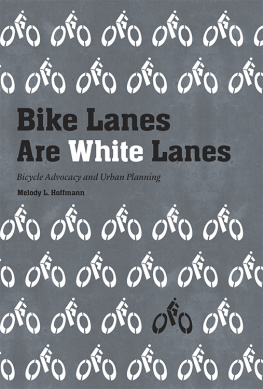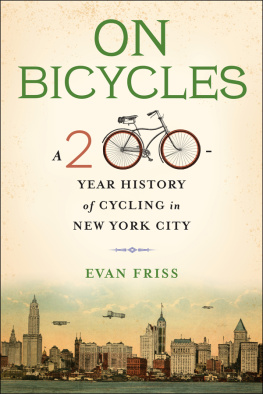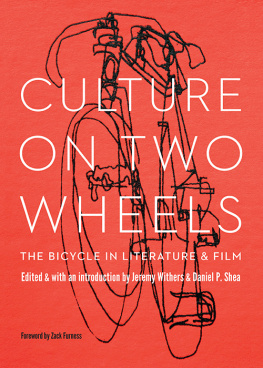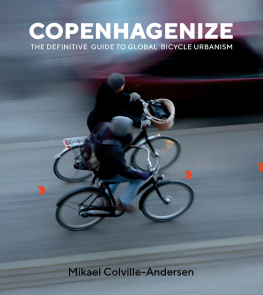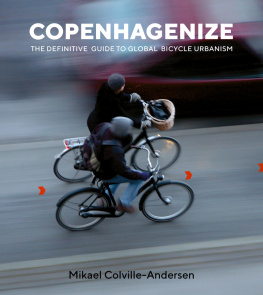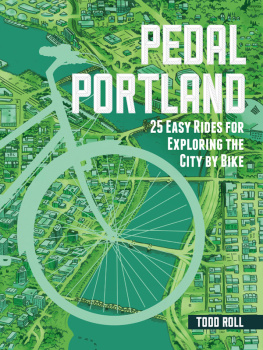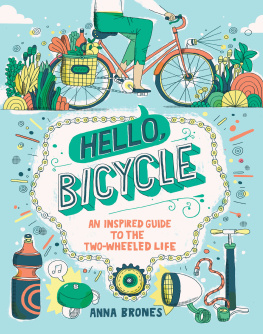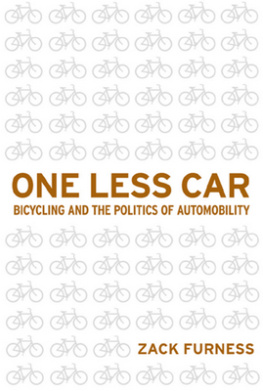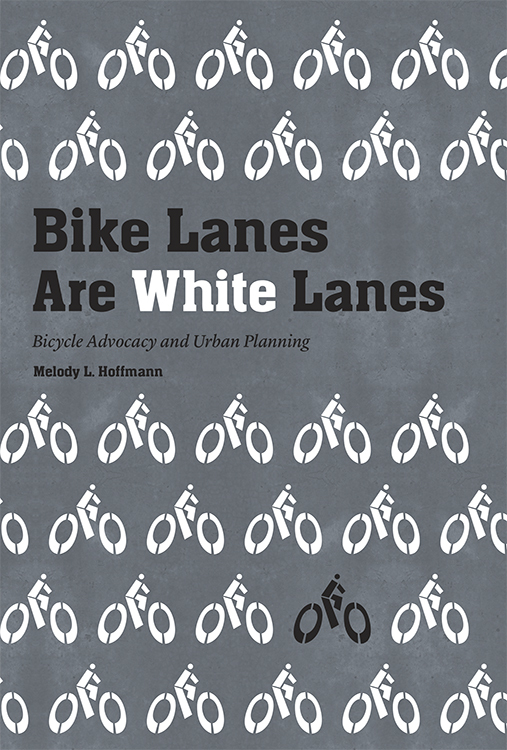For anyone interested in the urban role of cycling, this is an important book. Informed by an overdue concern with race, class, and gender, it critically redresses imbalances in our current understandings of cycling. [Hoffmann] usefully punctures a general liberal, middle-class complacency over the implicitly assumed superiority of the bicycle.... Indispensable reading if our goal is to broaden cyclings appeal and to make inclusive and just cities, as well as genuinely ecologically sustainable ones.
Important to many fields: transportation, race, city planning, housing and migration, sustainability, community organizing, planning and policy processes, and equity.... In the emerging scholarship concerning bike equity, Melody Hoffmann is an early and influential entrant.
Bike Lanes Are White Lanes
Bicycle Advocacy and Urban Planning
Melody L. Hoffmann
University of Nebraska Press | Lincoln & London
2016 by the Board of Regents of the University of Nebraska
Author photo Walter Griffin
Cover designed by Rachel Gould
Portions of chapter 4 were previously published in Recruiting People Like You: Socioeconomic Sustainability in Minneapoliss Bicycle Infrastructure, in Incomplete Streets: Processes, Practices, and Possibilities, ed. Stephen Zavestoski and Julian Agyeman (New York: Routledge, 2015), 13953 (reprinted with permission); and Melody Hoffmann and Adonia Lugo, Who Is World Class? Transportation Justice and Bike Policy, Urbanities 4, no. 1 (May 2014), www.anthrojournal-urbanities.com (reprinted with permission; all rights reserved, 2014 Urbanities).
All rights reserved
Library of Congress Cataloging-in-Publication Data
Names: Hoffmann, Melody L., author.
Title: Bike lanes are white lanes: bicycle advocacy and urban planning / Melody L. Hoffmann.
Description: Lincoln: University of Nebraska Press, [2016] | Includes bibliographical references and index.
Identifiers: LCCN 2015048894 (print)
LCCN 2016004792 (ebook)
ISBN 9780803276789 (hardback: alk. paper)
ISBN 9780803288201 (epub)
ISBN 9780803288218 (mobi)
ISBN 9780803288225 (pdf)
Subjects: LCSH : Bicycle commutingSocial aspectsUnited States. | Bicycle lanesUnited States. | City planningUnited States. | Zoning, ExclusionaryUnited States. | Community development, UrbanUnited States. | RacismUnited States. | United StatesRace relations. | BISAC : SOCIAL SCIENCE / Sociology / Urban. | SOCIAL SCIENCE / Ethnic Studies / African American Studies. | POLITICAL SCIENCE / Public Policy / City Planning & Urban Development.
Classification: LCC HE 5737 . H 64 2016 (print) | LCC HE 5737 (ebook) | DDC 338.3/472dc23
LC record available at http://lccn.loc.gov/2015048894
The publisher does not have any control over and does not assume any responsibility for author or third-party websites or their content.
For all the people who ride their bikes against traffic and on the sidewalk
Contents
Writing a book is a privilege. It is also arduous. There are many people to thank for getting this text into the form you see today. At the forefront of my mind are the people who most recently assisted me in this project. From the beginning, Kristen Elias Rowley at the University of Nebraska Press was a supportive and understanding editor. The reviewers of my manuscript sent me constructive and kind comments; their positive approach helped me create a stronger project. Ann Baker at the University of Nebraska Press swiftly answered all of my tedious questions about formatting, and Sara Springsteen offered insightful editing in the manuscripts final stages. Sarah Kaip was a tremendous help right up to the deadline in helping me reformat and proofread my manuscript. Marc Tasman, my digital media teacher of many years, and Lauren Kastner, my journalism student, assisted me with digital photography editing for this books online photography archive (bikelaneswhitelanes.com).
This book is a product of my PhD dissertation, which I successfully defended in 2013, so many thanks go to those who helped me through the dissertation writing process. First and foremost, immense gratitude to my PhD adviser, Mary D. Vavrus. Mary always reminded me why this project is important, something that often slips from my mind when academic fervor takes over. I thank Zenzele Isoke for changing the way I think, research, and write. Chapter 3 is a reflection of her influence on my scholarship. Mark Pedelty has been my cheerleader since the beginning stages of my doctoral career. His enthusiasm for my research has been an important motivator during this project. Zack Furness was an academic inspiration for me well before this project came to be. It was his scholarship that proved one can study bicycles and make a career out of it. In general, a huge thank you to my dissertation committee for taking the time to talk with me, suggest pertinent literature and theory, read drafts of my chapters, and challenge me to make this a better project. My feminist writing group in graduate schooloh how I miss youinfluenced this work more than I probably even realize. Thank you to Dana Schowalter, Sarah Wolter, and Raechel Tiffe for the time you spent reading and editing these chapters. Your support was crucial.
This book would be nothing without all of the community members willing to speak with me about bicycle advocacy and neighborhood history. I thank all of them for their time and commitment to making this world a better place (even if at times we disagree on how to get there). There are a few community members who became my unofficial research assistants. I want to thank Steve Whitlow, who took an inordinate amount of time to talk with me about the Riverwest 24, the neighborhood, and all the craziness that comes with the event. His honesty, vulnerability, and excitement for his neighborhood and the event made this project much stronger than had his voice not been heard here. Nicholas Hengen Fox sent me updates on Portlands bicycle scene and related community tensions. Even though I could not always be physically present, he relayed photographic updates of North Williams Avenue so I could track the constant development and gentrification. And in Minneapolis, Bill Dooley has been an amazing resource. The amount of information he sends me on a weekly basis could be its own book. I appreciate the trust he has in me to tell the story of bicycle inequity in Minneapolis.
There are numerous people who have shaped my thinking on bicycle equity. Many of those people are cited in this book. If you and I have had a meaningful conversation about the socioeconomic and cultural disparities in urban bicycling then I truly thank you for helping me think through this project. My gratitude goes out to Adonia Lugo, Anthony Taylor, Laura Kling, and the staff at Cycles for Change, as well as numerous other bicycle advocates who are doing actual work to disrupt normative bicycle culture. Bruce Epperson assisted in my retelling of bicycle advocacy history in the United States. Jason Laurendeau and Carly Adams, via a NASSS panel proposal, inspired the haunting references in chapter 3. A thank you to Minnesota Monthly for sending me a back issue for my research in chapter 4. I have gleaned a lot about bicycle advocacy by participating in various bike events, races, and workshops. Due to the impossibility of listing them all, a general thank you to the Milwaukee and Minneapolis bicycle communities for what you have taught me. Toward the end of my writing, the national Black Lives Matter movement became a big part of my life. Sometimes I had to choose between attending an action and staying home to write my manuscript. It was comforting to know that even when I stayed home to work on my book I was trying, in a very small way, to add to the movement. Thank you to all the activists involved with Black Lives Matter. You have been an inspiration in my academic writing, teaching, and advocacy work.

